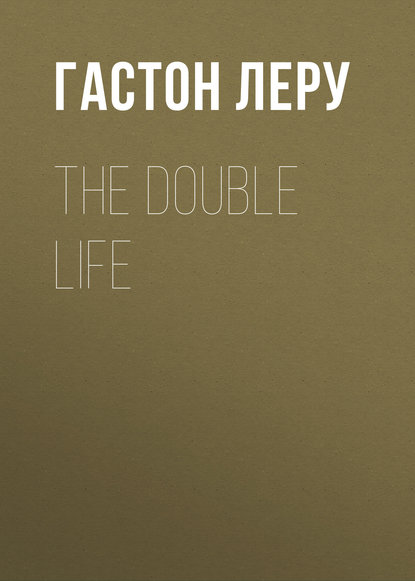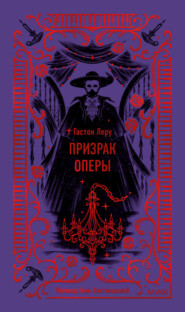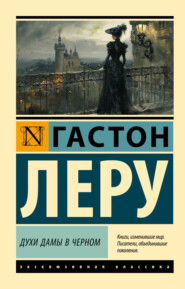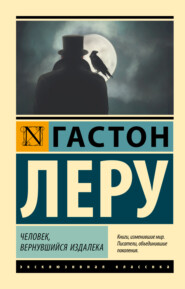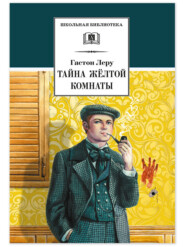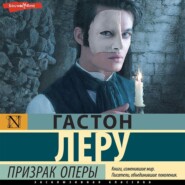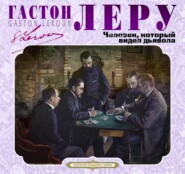По всем вопросам обращайтесь на: info@litportal.ru
(©) 2003-2024.
✖
The Double Life
Автор
Год написания книги
2018
Настройки чтения
Размер шрифта
Высота строк
Поля
Théophraste resorted once more to oaths and insults, and called Marceline in such a tone that she ran to him in spite of herself. The spectacle which awaited her in the kitchen was atrocious. Signor Petito was lying on the wooden table, his eyes bursting from their orbits, a handkerchief in his mouth, which nearly suffocated him. Théophraste had had the time, and was possessed with the extraordinary strength to tie his hands and ankles with cords. Signor Petito’s head hung a little beyond the edge of the table, and under it there was a bowl which M. Longuet had placed there to prevent soiling anything. The latter with palpitating nostrils had caught Signor Petito by the hair with his left hand. In his right he clasped the handle of a notched kitchen knife.
Gnashing his teeth, he cried out, “Strike the flags.”
As he said this he made the first cut at the right ear. The cartilage resisted. Signor Petito’s muffled groans could just be heard. M. Longuet, who was still in his night-shirt, worked like a surgeon bent upon a difficult operation. Marceline’s strength failed her, and she fell upon her knees. Signor Petito, in attempting to struggle, threw the blood from his ears across the kitchen, and Théophraste, letting go his hair, struck him a blow across the head. “Be a little careful,” said he, “you are splashing the blood all over everything.”
The cartilage still resisted, so taking the right ear in his left hand, with a strong blow with the notched knife he tore it away. He placed the ear in a saucer which he had previously placed on the sink, and allowed the water to flow over it. Then he came back to the second ear. Marceline groaned very loudly, but he silenced her with a glance. The second ear was cut off much more easily, and with more dispatch.
By this time Signor Petito had swallowed half of the handkerchief, and was suffocating. Théophraste took the handkerchief out of his mouth and threw it out into the clothes-basket near by. He then untied his ankles and wrists, and signed to him to leave the apartment as soon as possible. He had the forethought to wrap his head in a dish-cloth, so that the blood would not stain the stairway or the janitor’s family. As Signor Petito passed by, in agony, Théophraste put the washed ears into his vest pocket.
“You forgot something,” he said. “What would Signora Petito say if you went back without your ears?” He closed the door. Looking at Marceline, who was on her knees, paralysed with horror, he wiped the bloody knife on his sleeve.
CHAPTER XV
Adolphe Consulted
THEOPHRASTE, the next day, seemed to have forgotten all the incidents of the night before, or at least to attach very little importance to them.
As to Marceline, she was far too agitated to make any direct mention of it. However, she knew Adolphe would be calling at noon and she was resolved to find out the cause of Théophraste’s actions before he came so that she could tell Adolphe the best to act. The thing that struck her most was Théophraste’s sudden show of courage and strength. Before he had shown excessive lack of courage, and he was naturally physically weak. Suddenly, to be seized with all the nerve necessary to meet a burglar and then to have the strength to gag and bind him and cut off his ears, was unnatural. He had always recoiled from the sight of blood, and here he was fairly reveling in it. What could all this mean? He had suddenly turned from a quiet, inoffensive citizen to a ghoul.
It was with these thoughts that she approached Théophraste and demanded an explanation. He at first was loath to tell her, but her entreaties prevailed, and he eventually told her that it was the spirit of Cartouche that had seized him and forced him to do these horrible actions. He told her with a sort of bravado that there had been more than one hundred and fifty assassinations laid to his account.
Marceline was in a terrible state of mind and shrank from him. She declared that nothing in the world would make her live with him. She would apply for a divorce. She thought she had married an honest man, and now she had discovered him to be a thief and murderer. Here were enough grounds for a separation, and she declared her intention of securing it.
At this Théophraste became very melancholy, and entreated her to think of his side of the calamity. He told her how necessary her help was to him, and with Adolphe’s and her assistance he thought he could throw off this evil influence. By this time he had become quite rational, and they decided to consult Adolphe, and if necessary, have him live with them.
Marceline readily acquiesced in this suggestion. Adolphe arrived about 1 o’clock, and she took him into the sitting-room and was soon in earnest and animated council with him. Théophraste went into his office and waited anxiously for them to join him. After some time they returned, and Marceline insisted that Théophraste should do all that Adolphe should ask of him, which he readily consented to do, having confidence in his friend.
Later on in the afternoon Théophraste and Adolphe went for a walk into the city. Théophraste immediately began asking questions as to Adolphe’s progress in the search for the treasures. He, however, was in no mood to tell much. Marceline’s story of the night before had driven all thoughts of the treasure out of his head, and he answered somewhat abruptly that nothing of importance had been found, and that he must think of Théophraste’s health first, before taking any further steps.
It was obvious to Théophraste that Adolphe was evading the subject, and he was determined to find out more of the matter.
He felt that Adolphe had more information, and so pressed him to speak. Adolphe then told how he had discovered that after the war most of the soldiers who had been serving with Cartouche had been discharged, and were left with no means of livelihood, and so, recognizing him as having the talent of a leader, they formed themselves into a party of bandits, and placed him at their head. At this time the police force of Paris was quite inadequate to cope with the many crimes; therefore Cartouche and his comrades resolved to turn their attention to this. He divided his men into troops, and gave them each a quarter, to guard over which he placed an intelligent lieutenant. When anybody was found out after curfew he was politely accosted and requested to turn over a sum of money, or if he had no money on him, to part with his coat. In exchange for this he was given a pass which entitled him to walk through Paris in perfect security at any time he pleased. He would have nothing to fear from Cartouche’s men. If he showed any resistance he was immediately killed. Cartouche had the clergy on his side, and was often able to make good use of them. One priest named Le Ratichon, was even hanged for him.
On reaching the Hotel de Ville, Adolphe stopped and asked Théophraste if he cared to cross the Place de l’Hotel de Ville.
He answered, “If you wish, certainly we will.”
“Have you often crossed the place?” said Adolphe.
“Yes, very often,” replied Théophraste.
“And nothing unusual has happened? Is there any place in Paris which you have some difficulty in passing?”
“Why, no, of course not. What is there to hinder me from going anywhere?”
However, Adolphe’s look made him reflect, and then he recalled having several times walked up the Place de l’Ordson, and when in front of the Institute he changed his mind and retraced his steps. He accounted for this rather by his absent-mindedness than by anything unusual. He recalled that he had never passed through the Rue Mazarine or crossed the Pont-Neuf. Neither had he crossed the Petit Pont. He had always turned at the corner of the Rue Ville du Temple, near the house with the grated windows.
“Why,” Adolphe asked, “can’t you pass these places?”
“I think it is because the paving stones are red; and I dislike that color.”
“You remember the Place de Grere?”
“Why, yes. It was there that the pillory and scaffold were erected. The wheel was placed there on execution days in front of the Rue Vanniere. There was the old coal harbor. I never passed that place without counselling my comrades to avoid the wheel. However, I will wager not one profited by it.”
“Nor you either,” said Adolphe. “It was there that you suffered the final torment. It was there that you were racked and expired by the tortures of the wheel.”
CHAPTER XVI
On Private Ground
AMONG all the paper that I found in the oaken chest, those which related to the death of Cartouche were by far the most curious, and presented the highest interest, in that they partly contradicted history. They denied with such persuasive strength, and such undeniable logic, that it is difficult to see how the great historians could have overlooked the real details, and the generations which have succeeded since the year 1721, should not have suspected the truth. History teaches us that Cartouche, after having suffered the rack in its most cruel form, during which he confessed nothing, not even a name or a fact, this Cartouche, who had only to die, and nothing to gain from his confession, nothing to soften his last moments, was brought to torment in the Place de la Grere, and it was there that he decided to speak. That they took him back to the Hotel de Ville, and that it was there that he betrayed his principal accomplices, after which he was racked and fastened to the cross, where he expired.
Immediately after this 360 persons were arrested, with the result that they were tried, and judicially massacred, the last one of them being executed two years after Cartouche.
Now in following the papers of Théophraste, we are not doing full justice to Cartouche. While Cartouche was an object of terror, he was at the same time an object of admiration. His courage knew no bounds, and he proved it at the time of his torture. At the moments when his sufferings were greatest, he did not speak. It was said that he only wished to die bravely. The great ladies of the court and of the city had hired windows and points of vantage from which to witness his death, and he did not wish to show them on the scaffold, a cowardly dastard, but the most daring and bravest of bandits. It is an historical fact that of the 360 persons who were arrested after his death, it was found that Cartouche was loved by all. The official report showed women throwing themselves in the arms of L’Enfant at the Hotel de Ville, even after the denunciation.
It is not necessary to mention all the protests that M. Longuet made against the dishonorable death attributed to Cartouche, but some of the preceding lines seem to show that he was right.
It was while conversing on this question that Théophraste and his friend arrived at the Rue de le Petit Pont, without passing over the bridge.
“My dear friend,” said Théophraste, “look at that house at the side of the hotel, which has the sign, ‘To the rendezvous of the Maraiches,’ and tell me if you find anything remarkable about it.” They were then in front of a low, narrow and dirty old house, a hotel. The door on the ground floor disclosed a counter for the sale of drinks. Above the door was a notice, “To the rendezvous of the kitchen-gardeners.” The hotel was leaning against a vast building of the eighteenth century, which Théophraste pointed out with his green umbrella. This building had a balcony of iron, wrought in a delicate design of the period.
“I observe a beautiful balcony, of which the feature in the design seems to be the quiver of the god of love.”
“Anything more?” asked Théophraste.
“I do not notice anything further,” said Adolphe.
“Do you notice the large gratings on the windows? There was a time, my dear Adolphe, when windows that had gratings on were very much in vogue. There were never so many grilled windows in Paris as in the year 1720, and I would swear that these were placed there the day after the affair of the Chateaux Augustins. The Parisians always protected their ground floor, but this did not trouble us very much, for we had Simon L’Auvergnat.”
Adolphe took the opportunity of asking Théophraste exactly who this Simon L’Auvergnat was. He was always referring to him, and without any obvious reasons.
“He was a very useful person,” said Théophraste, “he was the base of my column.”
“What do you mean by the ‘base of your column’?”
“You do not understand. Wait, and you soon will. Imagine yourself to be Simon L’Auvergnat. Stand like this,” and he indicated the position, against the wall of the house, that Adolphe was to take. He spread his legs and lowered his head, and raising his arms, leaned against the wall. “I will place you here,” said he, “on account of the cornice which is to the left. I remember that it was very convenient. Now, since you are the base of my column, I lean on that base and then–”
Before M. Lecamus had had time to see what was going to happen, Théophraste gripped his shoulders, leaped on the cornice of the hotel, from there to the balcony of the hotel at the side, and entered a room of which the window had been opened.
M. Lecamus, stupefied, looked up into the air, and was wondering to himself how on earth his friend could have disappeared in such a way, when suddenly piercing cries came from the room, and a voice yelled out, “Help! Robbers! Murder! Help!” Fearing some dreadful act, Adolphe rushed into the hotel. The passers-by were stopping in the street, and before long a crowd had collected. He leapt over the vast stairway with the agility of a young man, and arrived on the first landing at the moment the door opened, and Théophraste appeared, hat in hand. He was bowing to an old lady, whose teeth were chattering from fright, and whose hair was all done up in curl papers. “Dear madame,” he was saying, “if I had believed for one instant that I would have caused you such surprise, I would have remained downstairs. I am neither a robber, nor an assassin, my dear madam. All this is the fault of my friend Adolphe, who wanted me to show him how Simon L’Auvergnat could serve me as the base of a column.”
Adolphe had already seized his arm, and was drawing him toward the stairway. He made signs to the lady from behind Théophraste trying to make her understand that his friend was off his head. Thereupon, she fell unconscious into the hands of a chambermaid, and the stairway was soon filled with a crowd.
Adolphe profited by this to take Théophraste away. They passed through without hindrance, and were soon in the street again. Adolphe seemed not to hear Théophraste’s protests. With one hand he dragged him towards the Rue Huchette, and with the other dried the sweat which was running down his forehead.
“Where are you taking me to?” asked Théophraste.
Gnashing his teeth, he cried out, “Strike the flags.”
As he said this he made the first cut at the right ear. The cartilage resisted. Signor Petito’s muffled groans could just be heard. M. Longuet, who was still in his night-shirt, worked like a surgeon bent upon a difficult operation. Marceline’s strength failed her, and she fell upon her knees. Signor Petito, in attempting to struggle, threw the blood from his ears across the kitchen, and Théophraste, letting go his hair, struck him a blow across the head. “Be a little careful,” said he, “you are splashing the blood all over everything.”
The cartilage still resisted, so taking the right ear in his left hand, with a strong blow with the notched knife he tore it away. He placed the ear in a saucer which he had previously placed on the sink, and allowed the water to flow over it. Then he came back to the second ear. Marceline groaned very loudly, but he silenced her with a glance. The second ear was cut off much more easily, and with more dispatch.
By this time Signor Petito had swallowed half of the handkerchief, and was suffocating. Théophraste took the handkerchief out of his mouth and threw it out into the clothes-basket near by. He then untied his ankles and wrists, and signed to him to leave the apartment as soon as possible. He had the forethought to wrap his head in a dish-cloth, so that the blood would not stain the stairway or the janitor’s family. As Signor Petito passed by, in agony, Théophraste put the washed ears into his vest pocket.
“You forgot something,” he said. “What would Signora Petito say if you went back without your ears?” He closed the door. Looking at Marceline, who was on her knees, paralysed with horror, he wiped the bloody knife on his sleeve.
CHAPTER XV
Adolphe Consulted
THEOPHRASTE, the next day, seemed to have forgotten all the incidents of the night before, or at least to attach very little importance to them.
As to Marceline, she was far too agitated to make any direct mention of it. However, she knew Adolphe would be calling at noon and she was resolved to find out the cause of Théophraste’s actions before he came so that she could tell Adolphe the best to act. The thing that struck her most was Théophraste’s sudden show of courage and strength. Before he had shown excessive lack of courage, and he was naturally physically weak. Suddenly, to be seized with all the nerve necessary to meet a burglar and then to have the strength to gag and bind him and cut off his ears, was unnatural. He had always recoiled from the sight of blood, and here he was fairly reveling in it. What could all this mean? He had suddenly turned from a quiet, inoffensive citizen to a ghoul.
It was with these thoughts that she approached Théophraste and demanded an explanation. He at first was loath to tell her, but her entreaties prevailed, and he eventually told her that it was the spirit of Cartouche that had seized him and forced him to do these horrible actions. He told her with a sort of bravado that there had been more than one hundred and fifty assassinations laid to his account.
Marceline was in a terrible state of mind and shrank from him. She declared that nothing in the world would make her live with him. She would apply for a divorce. She thought she had married an honest man, and now she had discovered him to be a thief and murderer. Here were enough grounds for a separation, and she declared her intention of securing it.
At this Théophraste became very melancholy, and entreated her to think of his side of the calamity. He told her how necessary her help was to him, and with Adolphe’s and her assistance he thought he could throw off this evil influence. By this time he had become quite rational, and they decided to consult Adolphe, and if necessary, have him live with them.
Marceline readily acquiesced in this suggestion. Adolphe arrived about 1 o’clock, and she took him into the sitting-room and was soon in earnest and animated council with him. Théophraste went into his office and waited anxiously for them to join him. After some time they returned, and Marceline insisted that Théophraste should do all that Adolphe should ask of him, which he readily consented to do, having confidence in his friend.
Later on in the afternoon Théophraste and Adolphe went for a walk into the city. Théophraste immediately began asking questions as to Adolphe’s progress in the search for the treasures. He, however, was in no mood to tell much. Marceline’s story of the night before had driven all thoughts of the treasure out of his head, and he answered somewhat abruptly that nothing of importance had been found, and that he must think of Théophraste’s health first, before taking any further steps.
It was obvious to Théophraste that Adolphe was evading the subject, and he was determined to find out more of the matter.
He felt that Adolphe had more information, and so pressed him to speak. Adolphe then told how he had discovered that after the war most of the soldiers who had been serving with Cartouche had been discharged, and were left with no means of livelihood, and so, recognizing him as having the talent of a leader, they formed themselves into a party of bandits, and placed him at their head. At this time the police force of Paris was quite inadequate to cope with the many crimes; therefore Cartouche and his comrades resolved to turn their attention to this. He divided his men into troops, and gave them each a quarter, to guard over which he placed an intelligent lieutenant. When anybody was found out after curfew he was politely accosted and requested to turn over a sum of money, or if he had no money on him, to part with his coat. In exchange for this he was given a pass which entitled him to walk through Paris in perfect security at any time he pleased. He would have nothing to fear from Cartouche’s men. If he showed any resistance he was immediately killed. Cartouche had the clergy on his side, and was often able to make good use of them. One priest named Le Ratichon, was even hanged for him.
On reaching the Hotel de Ville, Adolphe stopped and asked Théophraste if he cared to cross the Place de l’Hotel de Ville.
He answered, “If you wish, certainly we will.”
“Have you often crossed the place?” said Adolphe.
“Yes, very often,” replied Théophraste.
“And nothing unusual has happened? Is there any place in Paris which you have some difficulty in passing?”
“Why, no, of course not. What is there to hinder me from going anywhere?”
However, Adolphe’s look made him reflect, and then he recalled having several times walked up the Place de l’Ordson, and when in front of the Institute he changed his mind and retraced his steps. He accounted for this rather by his absent-mindedness than by anything unusual. He recalled that he had never passed through the Rue Mazarine or crossed the Pont-Neuf. Neither had he crossed the Petit Pont. He had always turned at the corner of the Rue Ville du Temple, near the house with the grated windows.
“Why,” Adolphe asked, “can’t you pass these places?”
“I think it is because the paving stones are red; and I dislike that color.”
“You remember the Place de Grere?”
“Why, yes. It was there that the pillory and scaffold were erected. The wheel was placed there on execution days in front of the Rue Vanniere. There was the old coal harbor. I never passed that place without counselling my comrades to avoid the wheel. However, I will wager not one profited by it.”
“Nor you either,” said Adolphe. “It was there that you suffered the final torment. It was there that you were racked and expired by the tortures of the wheel.”
CHAPTER XVI
On Private Ground
AMONG all the paper that I found in the oaken chest, those which related to the death of Cartouche were by far the most curious, and presented the highest interest, in that they partly contradicted history. They denied with such persuasive strength, and such undeniable logic, that it is difficult to see how the great historians could have overlooked the real details, and the generations which have succeeded since the year 1721, should not have suspected the truth. History teaches us that Cartouche, after having suffered the rack in its most cruel form, during which he confessed nothing, not even a name or a fact, this Cartouche, who had only to die, and nothing to gain from his confession, nothing to soften his last moments, was brought to torment in the Place de la Grere, and it was there that he decided to speak. That they took him back to the Hotel de Ville, and that it was there that he betrayed his principal accomplices, after which he was racked and fastened to the cross, where he expired.
Immediately after this 360 persons were arrested, with the result that they were tried, and judicially massacred, the last one of them being executed two years after Cartouche.
Now in following the papers of Théophraste, we are not doing full justice to Cartouche. While Cartouche was an object of terror, he was at the same time an object of admiration. His courage knew no bounds, and he proved it at the time of his torture. At the moments when his sufferings were greatest, he did not speak. It was said that he only wished to die bravely. The great ladies of the court and of the city had hired windows and points of vantage from which to witness his death, and he did not wish to show them on the scaffold, a cowardly dastard, but the most daring and bravest of bandits. It is an historical fact that of the 360 persons who were arrested after his death, it was found that Cartouche was loved by all. The official report showed women throwing themselves in the arms of L’Enfant at the Hotel de Ville, even after the denunciation.
It is not necessary to mention all the protests that M. Longuet made against the dishonorable death attributed to Cartouche, but some of the preceding lines seem to show that he was right.
It was while conversing on this question that Théophraste and his friend arrived at the Rue de le Petit Pont, without passing over the bridge.
“My dear friend,” said Théophraste, “look at that house at the side of the hotel, which has the sign, ‘To the rendezvous of the Maraiches,’ and tell me if you find anything remarkable about it.” They were then in front of a low, narrow and dirty old house, a hotel. The door on the ground floor disclosed a counter for the sale of drinks. Above the door was a notice, “To the rendezvous of the kitchen-gardeners.” The hotel was leaning against a vast building of the eighteenth century, which Théophraste pointed out with his green umbrella. This building had a balcony of iron, wrought in a delicate design of the period.
“I observe a beautiful balcony, of which the feature in the design seems to be the quiver of the god of love.”
“Anything more?” asked Théophraste.
“I do not notice anything further,” said Adolphe.
“Do you notice the large gratings on the windows? There was a time, my dear Adolphe, when windows that had gratings on were very much in vogue. There were never so many grilled windows in Paris as in the year 1720, and I would swear that these were placed there the day after the affair of the Chateaux Augustins. The Parisians always protected their ground floor, but this did not trouble us very much, for we had Simon L’Auvergnat.”
Adolphe took the opportunity of asking Théophraste exactly who this Simon L’Auvergnat was. He was always referring to him, and without any obvious reasons.
“He was a very useful person,” said Théophraste, “he was the base of my column.”
“What do you mean by the ‘base of your column’?”
“You do not understand. Wait, and you soon will. Imagine yourself to be Simon L’Auvergnat. Stand like this,” and he indicated the position, against the wall of the house, that Adolphe was to take. He spread his legs and lowered his head, and raising his arms, leaned against the wall. “I will place you here,” said he, “on account of the cornice which is to the left. I remember that it was very convenient. Now, since you are the base of my column, I lean on that base and then–”
Before M. Lecamus had had time to see what was going to happen, Théophraste gripped his shoulders, leaped on the cornice of the hotel, from there to the balcony of the hotel at the side, and entered a room of which the window had been opened.
M. Lecamus, stupefied, looked up into the air, and was wondering to himself how on earth his friend could have disappeared in such a way, when suddenly piercing cries came from the room, and a voice yelled out, “Help! Robbers! Murder! Help!” Fearing some dreadful act, Adolphe rushed into the hotel. The passers-by were stopping in the street, and before long a crowd had collected. He leapt over the vast stairway with the agility of a young man, and arrived on the first landing at the moment the door opened, and Théophraste appeared, hat in hand. He was bowing to an old lady, whose teeth were chattering from fright, and whose hair was all done up in curl papers. “Dear madame,” he was saying, “if I had believed for one instant that I would have caused you such surprise, I would have remained downstairs. I am neither a robber, nor an assassin, my dear madam. All this is the fault of my friend Adolphe, who wanted me to show him how Simon L’Auvergnat could serve me as the base of a column.”
Adolphe had already seized his arm, and was drawing him toward the stairway. He made signs to the lady from behind Théophraste trying to make her understand that his friend was off his head. Thereupon, she fell unconscious into the hands of a chambermaid, and the stairway was soon filled with a crowd.
Adolphe profited by this to take Théophraste away. They passed through without hindrance, and were soon in the street again. Adolphe seemed not to hear Théophraste’s protests. With one hand he dragged him towards the Rue Huchette, and with the other dried the sweat which was running down his forehead.
“Where are you taking me to?” asked Théophraste.





